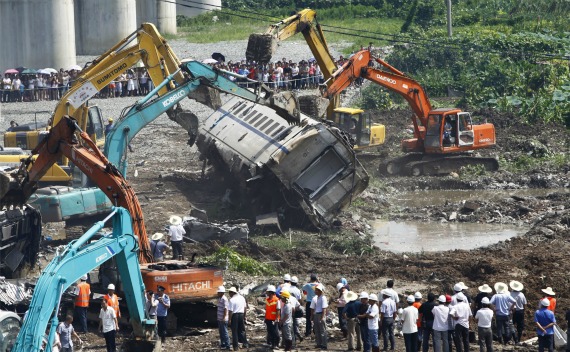China’s Policy Train Wreck
More on:

The July 23rd derailment of a high speed train in China, with at least 39 people dead and more than 190 injured, was a terrible tragedy. Of course, such devastating accidents such as this happen everywhere, whether due to human error, equipment malfunction, or as originally reported in this case, a natural disaster (reportedly in the form of a lightning strike). The question now is how is Beijing conducting itself in the aftermath of the crash?
Transparency is essential. The high-speed rail system has been the jewel in China’s massive infrastructure crown and a leading candidate for China’s foray into the world of high-tech exports. Given the arrest of China’s Minister of Railways last February for embezzling tens of millions of dollars and a series of small hiccups in the functioning of China’s rail system since that time, both the Chinese people and potential customers for Chinese railways abroad need to be reassured about the safety of the system.
Unfortunately, Beijing led off with the wrong foot. Directives from the central government explicitly forbade the Chinese media from investigating, commenting or reflecting on the accident. They were simply to “use information released from authorities.” Pictures of the train wreckage being buried in a small body of water rather than pulled apart for evidence gathering added to a sense that getting at the truth was not Beijing’s primary objective. In such a climate, even the firing of three railway officials did not necessarily inspire confidence; rather it raised additional questions as to whether these three were simply convenient scapegoats.
Fortunately, however, the Chinese people were interested in getting at the truth. A Sina Weibo poll—now blocked—asked internet users their opinion as to why the train wreckage was being buried. Official news reports had only detailed at least three possible reasons: filling the pond, helping with the rescue, and preventing others from stealing China’s high speed rail technology. The poll asked which reason the people believed, but also added a fourth reason that stole the show:
1) To fill the pond:
2) For Better rescue:
3) To prevent leakage of technology:
4) Destruction of evidence: 98% (61,382)
China’s blogosphere also came alive with morbid humor: “How far are we from heaven? Only a train ticket away” and “The Ministry of Railways earnestly requests that you ride the Heavenly Party Express.”
Beijing may be listening. Several days after the accident, Beijing is now reportedly removing the buried equipment to investigate the crash further. My advice to China’s leaders: take to heart the motto of a well-known American tabloid “Enquiring minds want to know” and report accurately what you discover. Otherwise, you risk the billions of dollars from high speed rail exports on which you are banking and chip away at your legitimacy at home.
More on:
 Online Store
Online Store